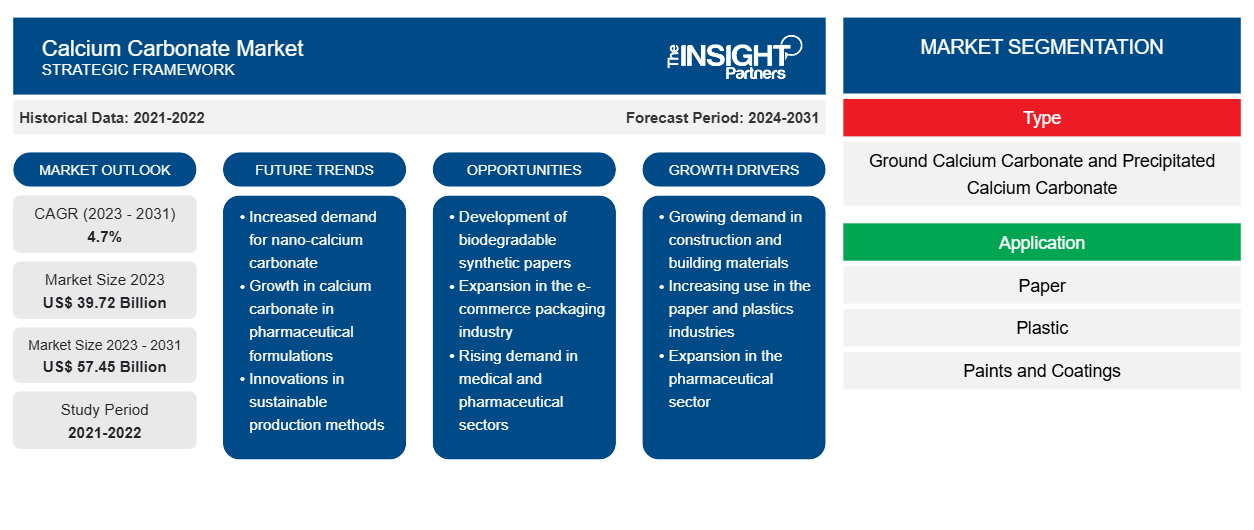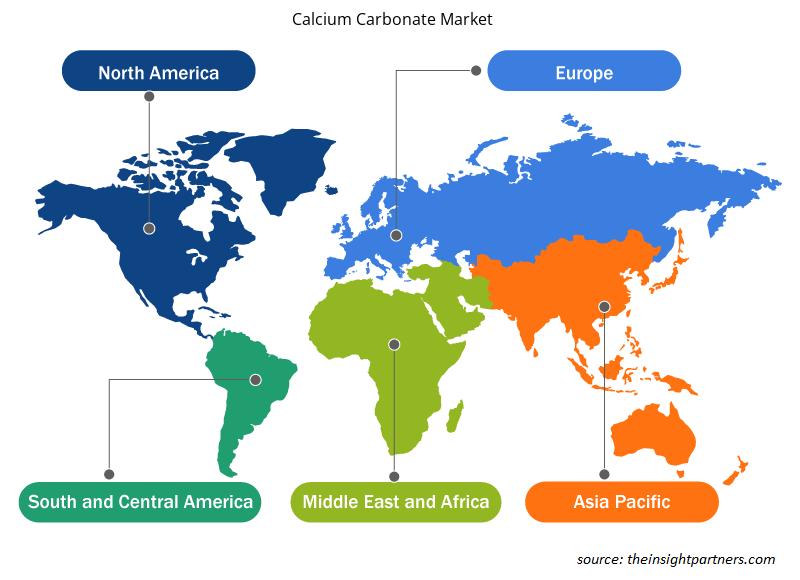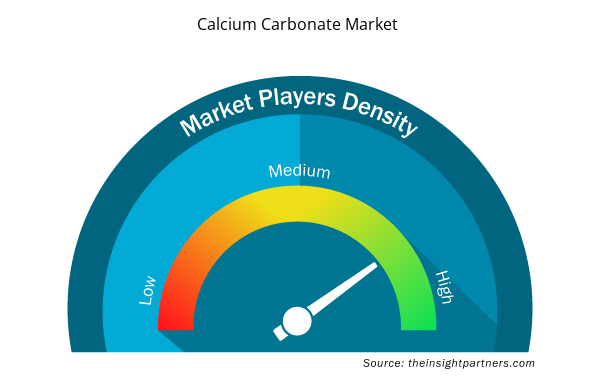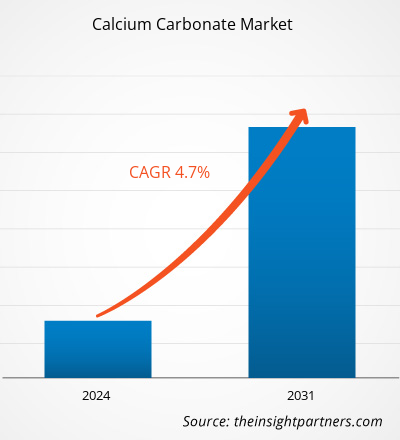The calcium carbonate market size is projected to reach US$ 57.45 billion by 2031 from US$ 39.72 billion in 2023. The market is expected to register a CAGR of 4.7% in 2023–2031. The rising demand for calcium carbonate micro and nanoparticles is likely to remain a key calcium carbonate market trend.
Calcium Carbonate Market Analysis
The high demand for calcium carbonate as plastic filler is mainly driving the market growth. Calcium carbonate is highly used in the plastics industry as a plastic filler, usually in the form of white granules. Plastic filler, which is mainly composed of calcium carbonate and base resin, is preferred as calcium carbonate is abundant and easy to obtain. Also, it improves the physical properties of plastic. In addition, calcium carbonate is not harmful to the environment.
Calcium Carbonate Market Overview
Calcium carbonate is a chemical compound with the molecular formula CaCO3, consisting of calcium, carbon, and oxygen. It is commonly found in nature as a mineral and is the main component of various rocks, such as limestone, marble, and chalk. Calcium carbonate is widely used in various industries and applications due to its versatile properties. It is a white, odorless powder that is insoluble in water but can dissolve in acids. It serves as a dietary supplement for calcium and is utilized as a filler or pigment in the production of paper, plastics, paints, and coatings. In addition, it is employed majorly in the manufacturing of cement and ceramics.
Customize This Report To Suit Your Requirement
You will get customization on any report - free of charge - including parts of this report, or country-level analysis, Excel Data pack, as well as avail great offers and discounts for start-ups & universities
Calcium Carbonate Market: Strategic Insights

- Get Top Key Market Trends of this report.This FREE sample will include data analysis, ranging from market trends to estimates and forecasts.
Customize This Report To Suit Your Requirement
You will get customization on any report - free of charge - including parts of this report, or country-level analysis, Excel Data pack, as well as avail great offers and discounts for start-ups & universities
Calcium Carbonate Market: Strategic Insights

- Get Top Key Market Trends of this report.This FREE sample will include data analysis, ranging from market trends to estimates and forecasts.
Calcium Carbonate Market Drivers and Opportunities
High Demand for Calcium Carbonate from the Paper Industry
The continuous demand from the paper industry is playing a crucial role in driving the growth of the calcium carbonate market. Calcium carbonate is extensively used as a filler and coating pigment in the production of paper and paperboard products. It enhances the brightness, opacity, and smoothness of paper, thereby improving its printability and overall quality. As the paper industry continues to witness steady growth globally, driven by factors such as increasing population, urbanization, and the demand for packaging materials, the demand for calcium carbonate as a key raw material remains consistently high.
Strong Growth of the Building and Construction Industry
Calcium carbonate is used in the production of cement and concrete. It also finds application in the production of asphalt and in road construction. The industrial construction sector is experiencing rapid growth due to several factors, such as the growing construction of new factories and industrial facilities, rising investments, and government initiatives. In the US, industrial construction is an essential part of the country’s economy. This sector has long been a driver of economic growth in the US. The growing industrial construction activities in various countries across the globe are driving the calcium carbonate market growth.
Calcium Carbonate Market Report Segmentation Analysis
Key segments that contributed to the derivation of the calcium carbonate market analysis are type and application.
- Based on type, the calcium carbonate market is segmented into ground calcium carbonate and precipitated calcium carbonate. The ground calcium carbonate segment held a significant market share in 2023.
- By application, the market is segmented into paper, plastic, paints and coatings, adhesives and sealants, building and construction, and others. The paper segment held a significant share of the market in 2023.
Calcium Carbonate Market Share Analysis by Geography
The geographic scope of the calcium carbonate market report is mainly divided into five regions: North America, Asia Pacific, Europe, Middle East & Africa, and South & Central America.
The North America region holds a significant share of the global market. In North America, the rising demand for sustainable and eco-friendly materials has boosted the market for calcium carbonate, particularly in applications such as paper, plastics, and coatings. In Europe, stringent environmental regulations and a strong emphasis on sustainability have propelled the demand for calcium carbonate as a preferred alternative to other mineral fillers. In the Asia Pacific region, rapid industrialization, urbanization, and population growth have fueled the demand for construction materials, plastics, and paper products, thereby contributing to the market growth of calcium carbonate.
Calcium Carbonate Market Regional Insights
The regional trends and factors influencing the Calcium Carbonate Market throughout the forecast period have been thoroughly explained by the analysts at Insight Partners. This section also discusses Calcium Carbonate Market segments and geography across North America, Europe, Asia Pacific, Middle East and Africa, and South and Central America.

- Get the Regional Specific Data for Calcium Carbonate Market
Calcium Carbonate Market Report Scope
| Report Attribute | Details |
|---|---|
| Market size in 2023 | US$ 39.72 Billion |
| Market Size by 2031 | US$ 57.45 Billion |
| Global CAGR (2023 - 2031) | 4.7% |
| Historical Data | 2021-2022 |
| Forecast period | 2024-2031 |
| Segments Covered |
By Type
|
| Regions and Countries Covered | North America
|
| Market leaders and key company profiles |
Calcium Carbonate Market Players Density: Understanding Its Impact on Business Dynamics
The Calcium Carbonate Market market is growing rapidly, driven by increasing end-user demand due to factors such as evolving consumer preferences, technological advancements, and greater awareness of the product's benefits. As demand rises, businesses are expanding their offerings, innovating to meet consumer needs, and capitalizing on emerging trends, which further fuels market growth.
Market players density refers to the distribution of firms or companies operating within a particular market or industry. It indicates how many competitors (market players) are present in a given market space relative to its size or total market value.
Major Companies operating in the Calcium Carbonate Market are:
- Cerne Calcium Company
- GCCP Resources LTD
- J M Huber Corporation
- Imerys S.A.
- Lafargeholcim
- Minerals Technologies Inc.
Disclaimer: The companies listed above are not ranked in any particular order.

- Get the Calcium Carbonate Market top key players overview
Calcium Carbonate Market News and Recent Developments
The calcium carbonate market is evaluated by gathering qualitative and quantitative data post primary and secondary research, which includes important corporate publications, association data, and databases. The following is a list of developments in the market for calcium carbonate and strategies:
- Cimbar Resources, Inc., today announced it has completed its acquisition of the Calcium Carbonates manufacturing assets in Sahuarita, AZ, from Imerys Carbonates, USA Inc. (Source: CIMBAR RESOURCES, INC., Company Website/News/ 2022)
- Imerys today announces new capacity expansion and optimization investment in the Sylacauga (AL) plant, the Group’s largest site in North America. This investment, part of a three-year site plan to support the growing demand for ground calcium carbonate products, is also part of Imerys’ commitment to grow its business in the communities and regions where it operates. (Source: Imerys, Company Website/Media Room/ Press Release/ 2022)
Calcium Carbonate Market Report Coverage and Deliverables
The “Calcium Carbonate Market Size and Forecast (2021–2031)” report provides a detailed analysis of the market covering below areas:
- Market size and forecast at global, regional, and country levels for all the key market segments covered under the scope
- Market dynamics such as drivers, restraints, and key opportunities
- Key future trends
- Detailed Porter’s Five Forces and SWOT analysis
- Global and regional market analysis covering key market trends, major players, regulations, and recent market developments
- Industry landscape and competition analysis covering market concentration, heat map analysis, prominent players, and recent developments
- Detailed company profiles
- Historical Analysis (2 Years), Base Year, Forecast (7 Years) with CAGR
- PEST and SWOT Analysis
- Market Size Value / Volume - Global, Regional, Country
- Industry and Competitive Landscape
- Excel Dataset



Report Coverage
Revenue forecast, Company Analysis, Industry landscape, Growth factors, and Trends

Segment Covered
Type and Precipitated Calcium Carbonate ); Application

Regional Scope
North America, Europe, Asia Pacific, Middle East & Africa, South & Central America

Country Scope
Argentina, Australia, Brazil, Canada, China, France, Germany, India, Italy, Japan, Mexico, Russian Federation, Saudi Arabia, South Africa, South Korea, United Arab Emirates, United Kingdom, United States

 Get Free Sample For
Get Free Sample For